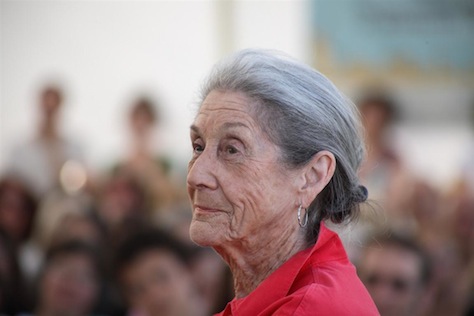Barely months after South Africa bid farewell to its iconic post-apartheid president Nelson Mandela, South Africans today are remembering the indispensable Nadine Gordimer, who might well be Mandela’s literary analogue. ![]()
That’s high praise, considering that Gordimer is in strong company alongside the late Alan Paton, 74-year-old J.M. Coetzee and other literary stars who produced a particularly compelling body of work in late 20th century South Africa.
There’s a case that you should start with Gordimer for the best sense of life in apartheid-era South Africa, and that includes both fiction and non-fiction.
Gordimer died in Johannesburg today at age 90, over two decades after winning the Nobel Prize in Literature for a body of work that examines the effects and realities of apartheid-era South Africa.
For example, Burger’s Daughter (1979) is the slightly fictionalized account of the story of Bram Fischer, a wealthy Afrikaner and attorney who supported the cause of ending apartheid, defending Mandela at the Rivonia trial and otherwise working to protect the legal rights of other African National Congress activists until he, himself was imprisoned in 1964 for 11 years, released just two weeks before his own death. Gordimer’s novel examines the story of Rosa Burger, the daughter of a martyred anti-apartheid activist, much like Fischer, and how she navigated life in South Africa in the shadow of her upbringing.
The Conservationist (1974), for which Gordimer won a Booker Prize, tells the story of a wealthy, if bumbling and well-meaning white South African who buys a farm on a whim. Over the course of the novel, it becomes clear that the protagonist isn’t a particularly material factor within the life of the farm, sustained by a community of black Africans. You can read the novel as a metaphor for the role of privileged white South Africans within the entirety of black-majority South Africa.
Gordimer’s writing style is more challenging than either Paton’s or Coetzee’s. It’s fragmentary, non-linear, more Joyce than Hemingway. But it’s powerful, and well worth the effort for understanding life in South Africa between 1948 and 1994.
South Africa, and the world, has lost a powerful voice, and her’s is a voice well worth remembering for its skillful grace no less than its role in changing the course of South African and world politics.
